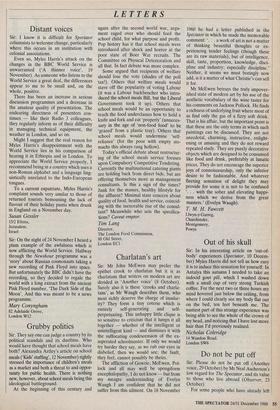Grubby politics
Sir: They say one can judge a country by its political scandals and its dustbins. Who would have thought that school meals have both? Alexandra Artley's article on school meals ('Kids' stuffing', 12 November) rightly stressed the importance of children's meals as a market and both a threat to and oppor- tunity for public health. There is nothing new, however, about school meals being this ideological battleground.
At the beginning of this century and again after the second world war, argu- ment raged over who should feed the school child, for what purpose and profit. Pop history has it that school meals were introduced after shock and horror at the poor state of Boer War recruits. The Committee on Physical Deterioration and all that. In fact debate was more complex.
Some argued that recipients of welfare should lose the vote (shades of the poll tax!). Others that welfare meals would stave off the popularity of voting Labour (it was a Labour backbencher who intro- duced the school meals Bill, but the Liberal Government took it up). Others that school meals would be an opportunity to teach the food underclasses how to hold a knife and fork and eat 'properly' (unneces- sary in the age of `non-food food' to be 'grazed' from a plastic tray). Others that school meals would undermine 'self- reliance' (for the poor with empty sto- machs this always rang hollow).
Today's official debate about restructur- ing of the school meals service focuses upon Compulsory Competitive Tendering. Currently the multinational catering giants are holding back from direct bids, but are offering themselves more as management consultants. Is this a sign of the times? Junk for the masses, healthy lifestyle for the affluent? Minimal state concern about quality of food, health and service, coincid- ing with the inexorable rise of the consul- tant? Meanwhile who sets the specifica- tions? Caveat emptor.
Tim Lang
Director, The London Food Commission, 88 Old Street, London EC1










































































































 Previous page
Previous page